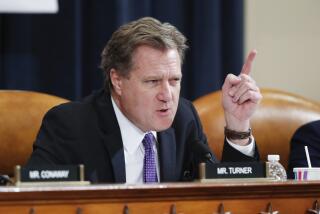Blair Spells Out Threats Posed by Iraq Regime
- Share via
LONDON — British Prime Minister Tony Blair made his case for disarming Iraq to Parliament and the world Tuesday, accusing President Saddam Hussein’s regime of producing chemical and biological weapons and trying to develop ballistic missiles and a nuclear bomb.
Convening an emergency legislative debate, Blair presented a summary of intelligence data asserting that Iraq has attempted to obtain uranium in Africa for nuclear use, readied biological arms for deployment at 45 minutes’ notice and begun concealing evidence in anticipation of a return of U.N. arms inspectors.
The report notes that Iraq has failed to obtain vital components for a nuclear bomb and says it would take one to two years for Hussein’s regime to build one with fissile materials from a black-market source and at least five years if sanctions were removed.
In addition, a shortage of missiles restricts Iraq’s ability to deliver chemical and biological payloads, according to the report. But intelligence gathered in mid-2001 and early this year reveals that Iraq is hard at work developing long-range missiles able to strike targets more than 620 miles away. The United Nations has banned Iraq from possessing missiles with a range of more than 93 miles.
Blair’s summary to Parliament came as the Bush administration pursued its campaign against the Hussein regime Tuesday on several fronts:
* Amid indications from U.S. officials that the administration might be ready as early as today to submit a resolution on Iraq to the United Nations, President Bush kept up his tough rhetoric toward the Hussein regime. “We don’t trust this man,” Bush said after a Cabinet meeting in Washington. “I again call for the United Nations to pass a strong resolution holding this man to account, and if they’re unable to do so, the United States and our friends will act, because we believe in peace.”
* In Warsaw, Defense Secretary Donald H. Rumsfeld and a CIA official gave a briefing at a NATO gathering that largely mirrored Blair’s dossier but apparently also suggested that Hussein’s government knows of and tolerates the presence of Al Qaeda leaders in Iraq, Defense Department officials said.
* In Kuwait, 1,000 members of the 11th Marine Expeditionary Unit arrived to participate in live-fire training exercises. Defense officials say the operation, called Eager Mace, was planned long ago.
The much-awaited detailed dossier was based on recent intelligence but does not contain hard-hitting new information that might be used to justify immediate military action against Iraq. Nor does that appear to be its goal. Recognizing European fears that the United States is rushing to war, Blair emphasized the need to seek aggressive international weapons inspections before using force against Hussein.
“I defy anyone to say that this cruel and sadistic dictator should be allowed any possibility of getting his hands on chemical, biological and nuclear weapons of mass destruction,” Blair said. “I cannot say that this month or next, even this year or next, that he will use his weapons.... But we know that diplomacy not backed with the threat of force has never worked with dictators and never will.”
Blair’s earnest and confident presentation got a respectful response in Parliament, where most lawmakers agree with his stance. But a vocal minority in the prime minister’s Labor Party expressed the discontent of many Britons.
The dissident legislators said the dossier did not convince them that a preemptive invasion of Iraq is necessary. They warned about the dangerous repercussions of such a war in the Middle East and beyond. And they maintained that Blair is part of a maneuver by Bush to distract Americans from corporate corruption and economic decline at home by charging into an ill-advised confrontation.
“Everyone here knows that this is not about whether the inspectors are going back,” said George Galloway of the Labor Party. “The issue is: Is this government prepared to join in a preemptive attack by the United States which is not sanctioned by the United Nations? The British people instinctively know that adding another war to the Middle East, where there are already quite enough wars, doesn’t seem like a sensible idea.”
The prime minister’s performance Tuesday reaffirmed his close alliance with the Bush administration, a partnership Blair described as vital to Britain’s future. Yet he appealed to doubters by framing the debate as a matter requiring concerted action by the international community.
“This was not an outline of the case for going to war. This was supporting evidence for getting U.N. inspectors into Iraq,” said Charles Heyman, a former British military officer and editor of Jane’s World Armies. “He’s talking to public opinion in the United Kingdom, to the U.S. and to the international community. This shows they are not going to war overnight now, and that’s a good thing.”
Asked by lawmakers if he endorses Bush’s call for “regime change” in Iraq, Blair insisted that he remains focused on dismantling the threat posed by the Iraqi arsenal.
“Regime change in Iraq would be a wonderful thing,” he said. “That is not the purpose of our action. The purpose is to disarm Iraq of weapons of mass destruction.”
Blair’s strategy responds to lingering concerns about a war, especially one waged by a U.S.- British coalition without U.N. approval, according to Boris Johnson, a legislator in the Conservative Party.
“Everybody is in favor of getting rid of Saddam if a convincing method can be offered,” Johnson said of his party. “But there is great anxiety about what, precisely, Bush is going to ask us to go along with.”
Blair brought powerful ammunition to the debate Tuesday: the report by Britain’s Joint Intelligence Committee, a 60-year-old unit composed of the chiefs of four intelligence agencies and other senior officials.
The prime minister called the committee “the heart of the British intelligence machinery” and said it was unprecedented for the government to publish such a document. The report does not discuss methods the committee used but says close allies contributed data. The authoritative tone suggests that the dossier drew from a mix of high-tech intelligence sources, spies and accounts by Iraqi defectors.
Nonetheless, one skeptical member of Parliament, Alan Simpson of the Labor Party, declared: “It is closer to propaganda than it is to scrutiny.”
In Baghdad, Iraqi officials responding to Blair’s litany of accusations said they want U.N. inspectors to return and determine the truth.
Blair’s “allegations are long,” said Amir Saadi, an Iraqi presidential advisor. “His evidence is short. His evidence is a hodgepodge of lies, half-truths and unsubstantiated allegations.”
The Blair dossier reinforced general allegations that have been made by U.S. and British politicians and experts with new, concrete details about the growth of Iraq’s secret weapons program since 1998, when U.N. inspections ended.
Hussein believes that weapons of mass destruction are the basis of Iraq’s regional power and is ready to use them against his own people, the report alleges. It also says Hussein “remains committed to developing longer-range missiles.”
Nonetheless, the development process will be slow and will require foreign expertise, specialized technology and test flights, the report concludes, confirming recent assessments by experts that Iraq’s delivery capacities are limited.
Iraq possesses as many as 20 Al-Hussein missiles with a range of about 400 miles that could strike targets in Israel, Turkey, Cyprus and Saudi Arabia, according to British intelligence. Iraq hit Israel with 93 missiles carrying conventional warheads during the 1991 Persian Gulf War.
The Al-Hussein missiles either were reassembled recently or concealed from the U.N., the result of finely honed techniques for thwarting inspections, British officials allege. Despite Iraqi promises, the report says, recent intelligence indicates that Iraqi leaders are discussing ways to cling to chemical and biological arms even if the world body, in a last-ditch effort to avert bloodshed, sends back inspectors.
“Iraq is already taking steps to prevent U.N. weapons inspectors finding evidence of its chemical and biological weapons programs,” the report says. “Intelligence indicates that Saddam has learned lessons from previous weapons inspections, has identified possible weak points in the inspections process and knows how to exploit them. Sensitive equipment and papers can easily be concealed and in some cases this is already happening.”
The report says the Iraqi military is trying to defeat future inspections by creating mobile laboratories to produce biological warfare agents such as anthrax, botulinum toxin, aflatoxin and ricin, according to the accounts of defectors during the last two years. Those weapons could be delivered by artillery, missiles and airborne sprayers, the report says.
Aerial photos in the report depict suspected centers for the production of chemical weapons, which Iraq allegedly has in stock and also can produce. Iraq has reconstructed old production facilities and built new ones in remote desert areas, such as a large chemical complex, Project Baiji, a former uranium enrichment base in Al Sharqat, the report says.
Nonetheless, British officials concede that components and supplies for weapons of mass destruction and ballistic missiles often have civilian uses. “Without U.N. weapons inspectors, it is very difficult therefore to be sure about the true nature of many of Iraq’s facilities,” the dossier says.
*
Special correspondent William Wallace in London contributed to this report. The British report is available at https://www.latimes.com/blairtext
*
British Report’s Findings
The British government released a dossier Tuesday on Iraq’s weapons programs. The report built on previously published information but also drew on what it called “significant” intelligence gathered as recently as this year. Based on that new information, the government concluded that:
Destructive capabilities
* Iraq has continued to produce chemical and biological agents.
* It has military plans for the use of chemical and biological weapons, including against its own Shiite Muslim population. Some of these weapons are deployable within 45 minutes.
* It has command and control arrangements in place to use chemical and biological weapons. Authority ultimately resides with Saddam Hussein, although he may have delegated this authority to his son Qusai.
Delivery systems
* It has developed mobile laboratories for military use, corroborating earlier reports about the mobile production of biological warfare agents.
* It has illegally retained as many as 20 Al-Hussein missiles, with a range of about 400 miles, capable of carrying chemical or biological warheads.
* It has started to deploy its Al-Samoud liquid-propellant missile and has used the absence of weapons inspectors to work on extending the missile’s range to at least 124 miles, which is beyond the limit of 93 miles imposed by the United Nations.
* It has started producing the Ababil-100 solid-propellant missile and is trying to extend the range to at least 124 miles.
Covert actions
* It has tried covertly to acquire technology and materials that could be used in the production of nuclear weapons.
* It has sought significant quantities of uranium from Africa, despite having no active civil nuclear power program that could require it.
* It has recalled specialists to work on its nuclear program.
* It has learned from previous U.N. weapons inspections and has already begun to conceal sensitive equipment and documentation in advance of the return of inspectors.
* It has pursued illegal programs to procure controlled materials for potential use in the production of chemical and biological weapons
More to Read
Sign up for Essential California
The most important California stories and recommendations in your inbox every morning.
You may occasionally receive promotional content from the Los Angeles Times.













